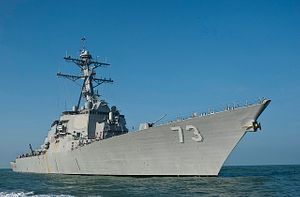In late October, the U.S. undertook yet another Freedom of Navigation Operation (FONOP) challenging China’ claims in the South China Sea. This latest FONOP was accompanied by cryptic comments from the Pentagon and left many analysts scratching their heads. According to the Pentagon, the USS Decatur sailed within waters claimed by China near the Paracel Islands, close to, but not within, the 12 nautical mile(nm) territorial sea limits of any of the islands. The Pentagon said the destroyer “conducted this transit in a routine lawful manner.” This could mean the passage was not “innocent” according to the 1982 UN Convention on the Law of the Sea (UNCLOS) – which is required in foreign territorial seas – but that was not made clear.
This FONOP has been criticized as redundant, unnecessary, and purposely provocative.
The Paracel Islands are a group of about 130 islands, reefs, banks and other maritime features. It is controlled and occupied by China and also claimed by Taiwan and Vietnam. China defeated South Vietnamese forces there in 1974. It would appear that the Decatur’s mission was to challenge China’s straight baselines enclosing the Paracels. Thus the Decatur, by crossing China’s declared baselines, entered China’s claimed territorial sea, which – according to China – requires prior notification.
The timing and ambiguity surrounding the event and its revelation indicate that coordination between the Pentagon and the State Department may have been lax. It occurred while Philippines President Rodrigo Duterte was on a state visit to China trying to re-establish good relations after their row over the South China Sea, in which the Philippines’ position was backed by the U.S. While the FONOP may have been planned well in advance of Duterte’s visit, it – or its announcement – could have been postponed until after he left China. Indeed, U.S. officials revealed the operation only hours after Beijing and Manila issued a joint statement announcing the two would seek to resolve their disputes in the South China Sea through negotiations. That it was not postponed could be interpreted as an attempt to pressure Duterte and even disrupt Philippines-China détente.
Not surprisingly, China – subsequently and perhaps consequently – announced military drills in the area. Perhaps more significant, China scored a public relations coup. China’s Defense Ministry said, “This shows that it is the United States which is the troublemaker when it comes to the stability of the South China Sea.” China’s state media chimed in, saying that the FONOP showed Washington “wanted to meddle on its own … after losing the support of other countries in the region.”
Perhaps the FONOP’s implementation and timing was meant to signal that the U.S. intends to forge ahead with its pivot regardless of Philippines lack of support. Whatever the reasons, China’s propaganda coup begs a counter and a fuller explanation of the FONOP from the U.S.
This FONOP was similar to the January 2016 USS Curtis Wilbur probe within 12 nm of Triton Island in the Paracels. According to Greg Poling of the Center for Strategic and International Studies in Washington, “they will have essentially performed the same FONOP, meaning an objection to China’s demand for prior notification four times in a year. It is redundant.”
But this may not be strictly accurate, at least in legal parlance. Indeed there may be nuanced differences. One may be that the Decatur was this time challenging China’s enclosing baselines around the Paracels including Triton Island, not China’s claim to a 12 nm territorial sea around the feature itself. Another is that the Decatur may have entered China’s claimed territorial sea in other than innocent passage, that is launching and receiving aircraft, surveying the bottom, undertaking live fire exercises, or with its deck guns uncovered, and the like. But this is a fine legal point lost on all but esoteric legal specialists and anyway remains shrouded in vagueness and ambiguity. If not explained and elaborated as to what it did and why, the operation may have been counterproductive. The other difference is that the Decatur operation was for the first time carried out under the U.S. Third Fleet command in San Diego. This has meaning primarily for the U.S. Navy, not an external audience.
It is clear to the international law of the sea and political community that China’s baselines enclosing the Paracels are not in conformity with UNCLOS. But the U.S. is in a weak position to challenge this violation because it – alone among major powers – has not ratified the Treaty, but instead insists that provisions it favors and interprets to its benefit are “customary international law” and must be observed.
The UNCLOS provides that only an archipelagic state can draw archipelagic baselines enclosing its islands. An archipelagic state is “a State constituted wholly by one or more archipelagoes.” Thus China cannot establish archipelagic straight baselines around the Paracels. This is obvious, well-known and relatively uncontroversial. Yes, China’s claim violates these provisions. Still, there is no need for bloody-minded policymakers to challenge it with gunboat diplomacy. A diplomatic note would suffice to protect navigational rights.
An obvious question is why, in the waning weeks of the Obama administration, would his military leaders purposefully antagonize China with such a redundant, unnecessary, provocative action. It almost seems as if they want to exacerbate relations with China for the next U.S. president.
The outgoing U.S. administration should not prejudice the political environment for the next one. However it seems that in their last days in power, policymakers responsible for Asia are unnecessarily tilting at windmills and stirring the pot.
Mark J. Valencia is an Adjunct Senior Scholar at the National Institute for South China Sea Studies, Haikou, China.

































